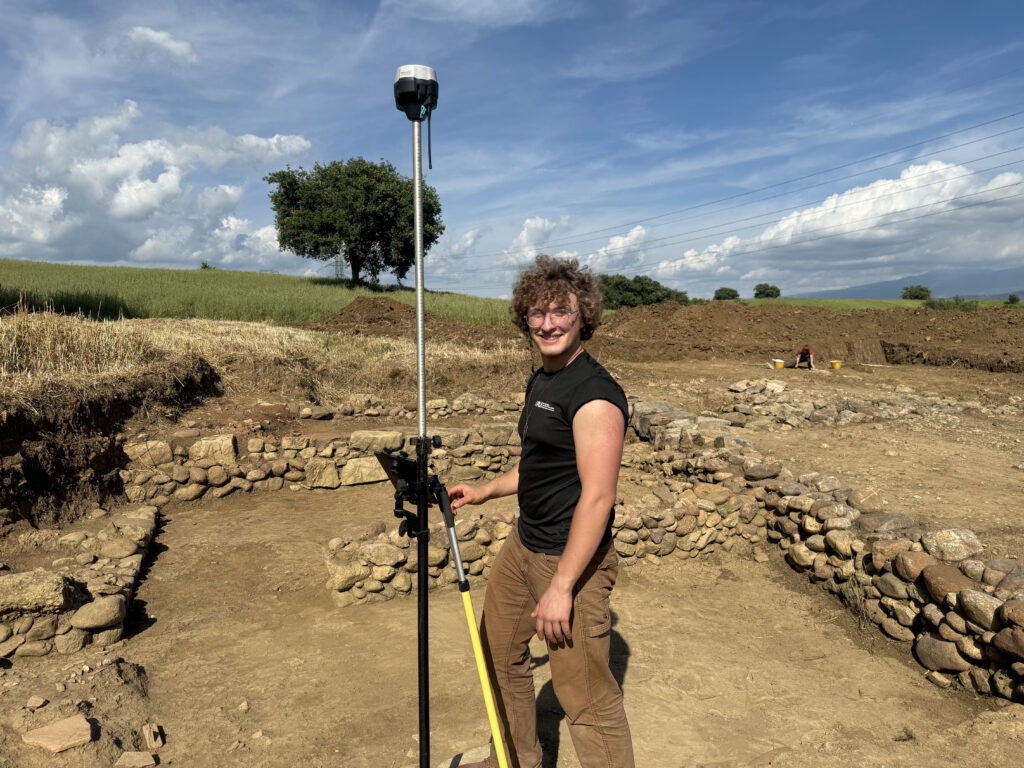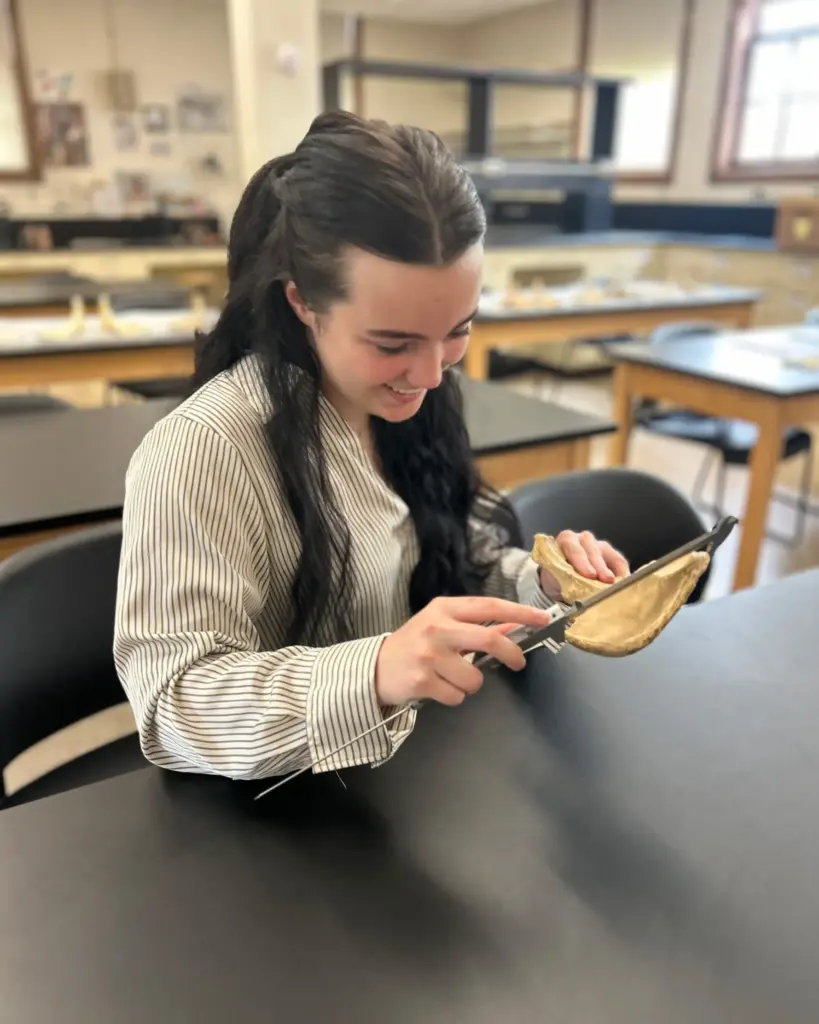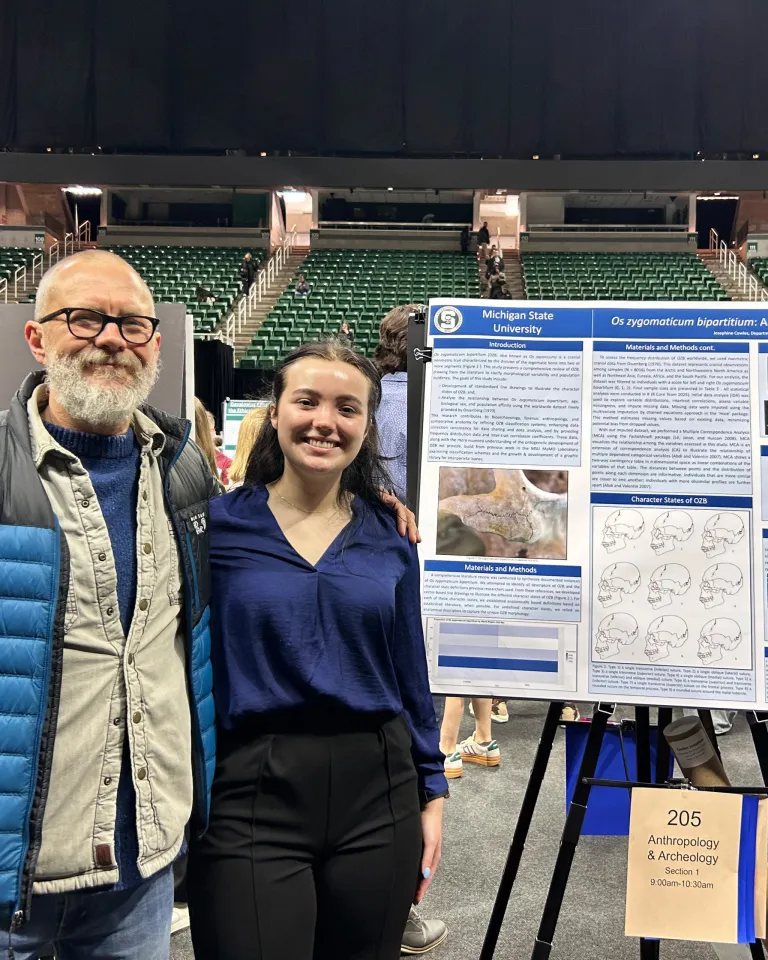Field Voices invites all Spartan anthropology students to share details about the projects and activities they have participated in while here at MSU. This is an opportunity to highlight your experiences, explore the diverse opportunities within your major, and understand how your work can support your academic and professional goals.
STUDENT EXPERIENCE
Laila Komis

Graduation Class: 2026
Major: Anthropology
Minors:
- Law, Justice, and Public Policy
- Peace and Justice Studies
- Cognitive Science
- Environment and Health
- Linguistics
Hometown: Dearborn Heights, Michigan
What inspired you to choose anthropology as your major?
I was born and raised in Michigan and often traveled to Lebanon to see the other side of my family. Moving between these two worlds exposed me to different cultural norms, languages, and ways of life. That experience sparked my desire to understand people and cultures more deeply. Anthropology brought all of those interests together. I love meeting people and forming meaningful connections, and the field of anthropology opens doors to diverse communities and lifestyles.
Describe your anthropological experience:
My first hands-on experience was in 2023 in the Archaeology Lab at McDonel Hall. I worked on a group project identifying, categorizing, and logging hundreds of lithic materials for the Quebrada Jaguar Lithics Project in the fall. I continued lab work with Dr. Rademaker in the spring, where I washed, cataloged, and analyzed artifacts from a 19th-century historical farmstead in Michigan. I loved the archaeology lab, but I also wanted to explore other subfields. I began independent research with Dr. Eric Montgomery on how schizophrenia became racialized by examining environmental factors in historically redlined neighborhoods. I later presented this work at the Anthropology Research Symposium and at the University Undergraduate Research and Arts Forum (UURAF) event.
Dr. Montgomery later added to me a digital storytelling project where I met Dr. Elizabeth Drexler. Drexler helped me obtain funding through a Provost’s Undergraduate Research Initiative (PURI) for this project which examines how digital stories, images, films, and other creative media shape contemporary efforts for economic and social justice. Most of my work involves writing and analysis, but I’m also refreshing data on what justice issues students care about, how they interact with advocacy media, and what recent scholarship shows. I love staying busy with research and being part of a larger cause, knowing my work may one day help others. I hope to publish my own work in the future and build strong connections along the way.
Don Henrikson

Graduation Class: 2026
Major: Anthropology
Minors: Earth Observations and Geospatial Analytics
Hometown: China Twp., Michigan
What inspired you to choose anthropology as your major?
I was inspired to choose anthropology as my major because of my dad. When I was around six years old, he was hunting in our woods and stumbled upon an old trash dump from the 1800s. For the next couple of years, we would periodically head out there to dig up old glass bottles and plates. I just remember the excitement I would feel after brushing away the loose, sandy dirt to reveal a pristine piece of decorated pottery—or even just a plain glass bottle. It took me years to realize that I could build a career around that feeling of discovery, and lord knows I have never looked back since.
Describe your anthropological experience:
From May to June of 2025, I attended the IMPERO Monteverdi field school in Tuscany, Italy. The IMPERO project focuses on settlements along the Ombrone River spanning from the 6th century BCE to the 14th century CE. During the 2025 field season, our team concentrated on the site of Podre Cannicci, a small Etruscan/Roman vicus (village) from the 2nd century BCE. This year, the team I was part of excavated a room within what we called Area 1. The room appeared to be the heart of manufacturing in the settlement, and we wanted to uncover further evidence of this. By the end of the field school, we had uncovered multiple manufacturing kilns, a furnace, many artifacts related to cooking and smelting, and—most exciting to me—a whole new set of walls and pillars that revealed the room’s original construction.
This is exactly what I loved most about this field school—and about this job—the excitement I get when uncovering something new. Whether it was the bronze coin I found on the first day or the massive storage room with multiple dolia (massive human-sized pots) uncovered near the end, that feeling of discovery was everywhere on site. Beyond being a required experience for most jobs in archaeology, this field school gave me so much that will support my professional goals. From the many connections I made to the knowledge of archaeological methods, this experience was invaluable to my career.



Jules McClary

Graduation Class: 2026
Major: Anthropology
Minors: Museum Studies, Asian Studies & History
Hometown: Bloomfield Hills, Michigan
What inspired you to choose anthropology as your major?
I chose anthropology as my major because I have an interest in human history and culture. I felt that this major would allow me to explore a variety of career options, especially since I was unsure of my path when I entered college. During my sophomore year, I discovered the museum studies program, which introduced me to the museum collections field—a perfect blend of my interests in human history, culture, and art. This path will allow me to be able to work with physical objects and combine all my interests to do something that I love!

Describe your anthropological experience:
This summer, I worked at the Lansing Board of Water & Light as their Archival Intern. While there, I worked on three major projects: two annotated bibliographies about the company and its history, and a photo digitization project for the Board’s photographic collection. By the end of the summer, I had collected and summarized over 40 sources for my annotated bibliographies and scanned and uploaded over 830 photos to the company’s digital collections software. This work will be used in future exhibits and helps preserve the company’s history, as many of the photos had not been previously scanned or duplicated, putting them at risk of damaged or loss.
My favorite part of the project was getting to look through the old photos and see how the Lansing area has changed over time. I have future goals of working in museum collections, so this experience helped develop my research skills for working with unfamiliar objects and provided valuable insight into navigating software used in museum collections.
Josie Cowles

Graduation Class: 2026
Major: Anthropology
Hometown: Belfast, Maine
What inspired you to choose anthropology as your major?
Ever since I was a kid, I’ve loved science, history, and forensics. When I discovered that anthropology combines all three, I knew it was the right path for me.
Describe your anthropological experience.
My anthropology journey began freshman year in Dr. Wrobel’s Bioarchaeology Lab, where I learned the basics of osteology by conducting a biological profile. I later presented this research at the University Undergraduate Research and Arts Forum (UURAF) in 2023. That same spring, I joined the MSU Forensic Anthropology Lab, assisting graduate students with ongoing forensic projects. The following year, I continued my work with Dr. Joseph Hefner on an National Institutes of Health-funded project researching cranial nonmetric traits.



(The photographed skeletal material represent individuals who opted to donate their body for scientific research. These materials are used for educational purposes and are respectfully handled and diligently curated by the MSU Forensic Anthropology Laboratory.)
In summer 2024, I participated in the Campus Archaeology Program’s field school, excavating the original MSU observatory. I gained hands-on experience in archaeological field methods, mapping, taking depths, and photographing artifacts. During the 2024–2025 academic year, I completed a Dean’s Assistantship with Dr. Hefner, focusing on Os zygomaticum bipartitum, a rare nonmetric cranial trait. Our goal was to refine its classification, and I presented our findings at both UURAF and the Anthropology Undergraduate Research Symposium.
Currently, I’m interning with Dr. Jered Cornelison at Western Michigan University Homer Stryker M.D. School of Medicine, where I’m gaining firsthand experience in forensic anthropology within a medical examiner’s office.
These experiences have shaped my academic career and confirmed my passion for research. The mentorship and hands-on opportunities I’ve had at MSU have prepared me for graduate studies and a future in forensic anthropology.
Melissa Teja

Year: Junior
Major: Anthropolgy
Minor: Environmental Social Science
Hometown: Johns Creek, Georgia
What inspired you to choose anthropology as your major?
I was drawn to anthropology because I saw an opportunity to develop my love of science alongside my passion for investigating the human experience.
Describe your anthropological experience.
In June 2023, I participated in the MSU Education Abroad program, working under Dr. Gabriel Wrobel at the Marco Gonzalez Maya Site in San Pedro, Belize. During this field school, I conducted archaeological surveys and excavations alongside other students, while gaining hands-on experience in photogrammetry, stratigraphic analysis, epigraphic analysis, cataloging, and curating osteological material. This field school was one of the best experiences of my life, furthering my passion for archaeology and field work.

Following the field school, I conducted research in the MSU Bioarchaeology Lab. My first project involved creating an osteobiography of an individual from Marco Gonzalez, using a standard biological profile to evaluate life history. This year, I received a PURI award for my current project, which is a discriminant function analysis to determine skeletal sex, that will be presented as a poster at the 2025 UURAF and the Society for American Archaeology’s 90th Annual Meeting.

Since 2023, I have served as Vice President of the Undergraduate Anthropology Club, where some of my favorite events have been guest speakers and trips to the Field Museum. My involvement in the Anthropology department has helped me grow in my research skills and my love for the field. The best part has been connecting with amazing people who share my passion, and getting to learn from incredible professors. I’m excited to hear back from the internships I’ve applied for the summer 2025 season and plan to apply to graduate programs in biological anthropology this fall.
STUDENT VOICE
Ryn Van Winkle

Year: Senior
Majors: Anthropology & Biochemistry and Molecular Biology
Minor: Quantitative Data Analytics
Hometown: Medford, Massachusetts
What inspired you to choose anthropology as your major?
I initially majored in Biochemistry and Molecular Biology, but my plans changed after taking courses in biological anthropology, paleopathology, and bioarchaeology. I wanted to expand my knowledge beyond the biochemistry textbook and apply the work I put into the four major macromolecules to archaeological material to better understand people. This approach helps me thoroughly understand the lives and circumstances of past populations, both as communities and as individuals, beyond just contextual clues.
Ryn’s Viewpoint

My focus is on the biological and biomedical aspects of anthropology. By expanding our study of osteopathic diseases beyond current sufferers, we can gain valuable insights into how these diseases develop across different ages, body types, genders, occupations, and more. Small communities engaged in manual labor will exhibit different disease patterns compared to those in larger cities. By considering past populations that resemble our small communities or past sufferers from these areas, we can improve the care provided to these people.
Despite being primarily white, I am Sioux on my mom’s side and Seminole on the dad’s side. I constantly struggled with what that meant for me in science and research as it tends to benefit developed areas and communities. I did not know how to honor that heritage but my work in anthropology changed how I viewed myself, science, and research. I realized that the work I initially planned wouldn’t benefit many communities, and I wanted to change that. My goal is to work in the biomedical field to better understand disease markers and apply this knowledge to various communities and archaeological burial sites. By doing so, I aim to catalog and track the development of bone diseases and make this information publicly accessible for the benefit of others.

Owen Kozdron

Year: Senior
Major: Anthropology
Minor: Environmental Social Science
Hometown: Williamston, Michigan
What inspired you to choose anthropology as your major?
During my second anthropology class, Introduction to Physical Anthropology, I was inspired. The class covered many topics that excited me. I was enthralled by the anthropological tendency to consider and care for those struggling in different places worldwide. I also loved learning about human and hominid ancestor evolution.
How has studying anthropology changed the way you understand different cultures and perspectives?
Studying anthropology has made me eager to explore different cultures and perspectives. Many of our fundamental beliefs and values are conditioned into us by our social and physical contexts. Gaining the awareness to question these is important to me and I believe it gives me a more holistic understanding of people, societies, and the world.

Can you share an example of how anthropology has helped you critically analyze social issues? You can use examples from class or other academic experience.
Anthropology has helped me understand how interconnected societal issues are. For example, the degradation of trust in each other and institutions, the internet, neoliberal ideology, and the inciting of distrust by elites. To create effective solutions for these issues, it is critical to trace the chain of impacts to the primary causes. This includes acknowledging where our own understanding reaches its limits and not hesitating to gain insights from other perspectives and people to create a more accurate and encompassing picture of the situation.